Parkson Bundle
Who Really Owns Parkson?
Ever wondered about the forces steering the ship at Parkson, a familiar name in Southeast Asian retail? Understanding the Parkson SWOT Analysis is key, but first, let's uncover the ownership structure that dictates its future. From its humble beginnings to its current status, the story of who owns Parkson is a tale of strategic shifts and market adaptation.
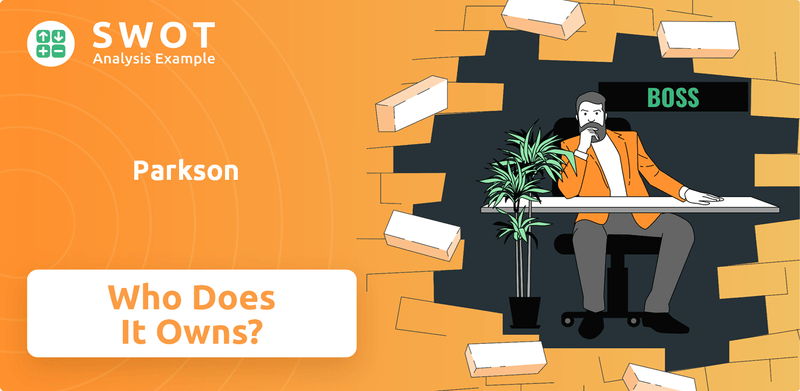
This exploration into Parkson's ownership delves into the evolution of the Parkson company, from its founders to the current shareholders. Discover the key players influencing Parkson's strategic decisions, including the Parkson SWOT Analysis, and how the company's ownership structure impacts its performance within the competitive landscape of Parkson Malaysia and beyond. Unravel the details of the Parkson Group and its subsidiaries to gain a comprehensive understanding of this retail giant.
Who Founded Parkson?
The history of the Parkson Group begins in 1987 with the founding of Parkson Retail Asia Limited. While the specific founders' names and initial equity details are not readily available in the provided information, the ownership structure evolved significantly over time.
The parent company, Parkson Holdings Berhad, was established in Malaysia in 1982 by William Cheng. This indicates that the early ownership of the company was primarily concentrated within the Lion Group, with Parkson Retail Asia Limited operating as a subsidiary.
Prior to its initial public offering (IPO), Parkson Retail Asia Limited's ownership was mainly held by its parent entities. This changed with the IPO, which brought in new investors and broadened the shareholder base.
The IPO on November 3, 2011, marked a significant shift in the Parkson ownership structure. The offering included both new shares and shares sold by existing shareholders. This move allowed for a wider distribution of shares, including to institutional and public investors. The IPO also included shares reserved for the company's directors, management, and employees.
- The IPO involved the issuance of 80,000,000 new shares by Parkson Retail Asia Limited.
- Existing shareholders, East Crest International Limited (ECIL) and PT Mitra Samaya (MS), offered 67,000,000 existing shares.
- An international placement of 136,150,000 shares was made to investors.
- A public offer of 10,850,000 shares was available in Singapore.
- Up to 3,500,000 shares were reserved for purchase by the Group's directors, management, and employees.
Parkson SWOT Analysis
- Complete SWOT Breakdown
- Fully Customizable
- Editable in Excel & Word
- Professional Formatting
- Investor-Ready Format
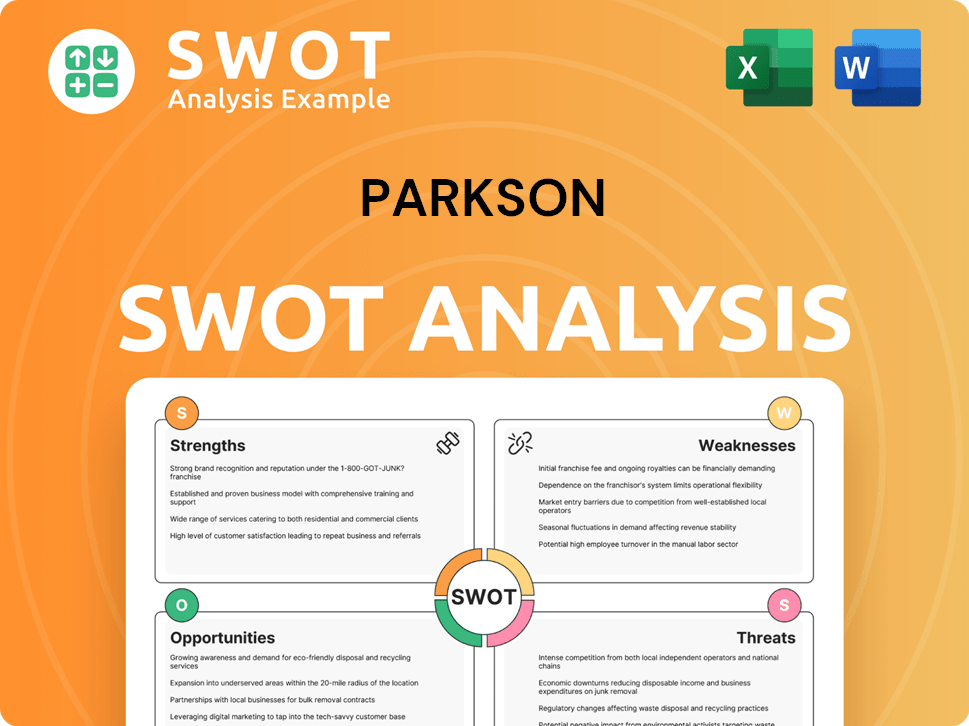
How Has Parkson’s Ownership Changed Over Time?
The evolution of Parkson's ownership structure has been marked by key events impacting its market presence and financial strategy. Parkson Retail Asia Limited's initial public offering (IPO) on the Singapore Exchange (SGX-ST) on November 3, 2011, was a pivotal moment, with a market capitalization of S$699.64 million. As of April 17, 2025, the market capitalization was at S$39.08 million. By June 10, 2025, it had risen to approximately $47.7 million, with 674 million shares.
A significant development in 2012 was the acquisition of a 41.82% stake in Odel PLC, a Sri Lankan fashion retail brand, for approximately Rs 1.424 billion. This strategic move was followed by a mandatory offer to minority shareholders and a rights issue to fund Odel's expansion, demonstrating Parkson's commitment to growth and market diversification. These actions have shaped the company's ownership and financial landscape, reflecting its strategic initiatives over time.
| Key Dates | Event | Impact on Ownership |
|---|---|---|
| November 3, 2011 | Parkson Retail Asia Limited IPO on SGX-ST | Established public ownership, market capitalization of S$699.64 million. |
| 2012 | Acquisition of 41.82% stake in Odel PLC | Diversification into Sri Lankan market, expansion of retail portfolio. |
| May 2025 | Parkson Holdings Berhad (PHB) ownership | PHB holds approximately 68% of Parkson Retail Asia Limited, becoming the controlling shareholder. |
Parkson Holdings Berhad (PHB), listed on Bursa Malaysia, is the controlling shareholder of Parkson Retail Asia Limited, holding approximately 68% of the shares as of May 2025. Tan Sri Cheng Heng Jem, the Chairman and Managing Director of PHB, has a substantial interest in PHB, which extends to its subsidiaries, including Parkson Retail Asia Limited. East Crest International Limited (ECIL) also plays a crucial role in the ownership structure, as Parkson Retail Asia Limited is a subsidiary of ECIL. These key stakeholders and their holdings define the current Parkson ownership structure, reflecting the company's strategic direction and financial backing.
The Parkson Group has a complex ownership structure with key stakeholders. Parkson Malaysia is a significant part of the company's operations. Understanding the ownership is crucial for investors and stakeholders.
- Parkson Holdings Berhad (PHB) is the controlling shareholder.
- Tan Sri Cheng Heng Jem has a substantial interest in PHB.
- East Crest International Limited (ECIL) is also a key entity.
- The company's market capitalization has fluctuated over time.
Parkson PESTLE Analysis
- Covers All 6 PESTLE Categories
- No Research Needed – Save Hours of Work
- Built by Experts, Trusted by Consultants
- Instant Download, Ready to Use
- 100% Editable, Fully Customizable
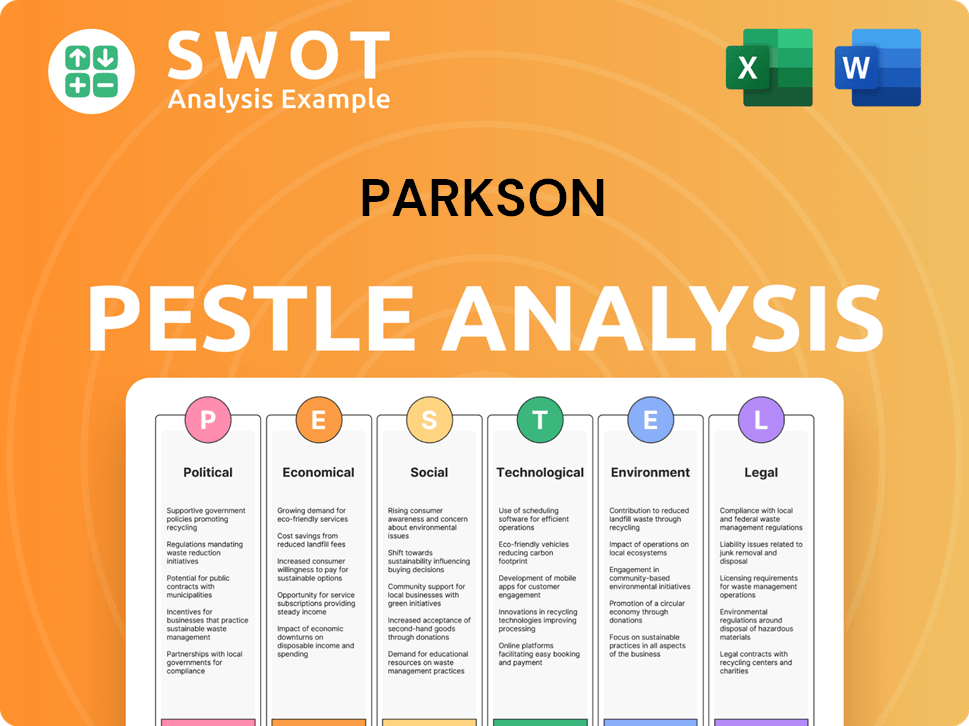
Who Sits on Parkson’s Board?
The current board of directors of the Parkson company includes Tan Sri Cheng Heng Jem as Executive Chairman, Cheng Hui Yuen, Vivien as Executive Director, and Michael Chai Woon Chew, Datuk Koong Lin Loong, and Sam Chong Keen as Independent Directors. Tan Sri Cheng Heng Jem also chairs the Nomination Committee and is a member of the Remuneration Committee. Cheng Hui Yuen, Vivien, is the daughter of Tan Sri Cheng Heng Jem and also serves as an Executive Director. This structure reflects a blend of family leadership and independent oversight, which is typical in many retail organizations.
The board's composition is designed to ensure a balance of skills and experience. The Nominating Committee reviews the board's size annually, focusing on expertise in accounting, finance, legal, business, management, industry knowledge, strategic planning, and customer-based experience. This approach helps to maintain effective governance and strategic direction for the company. Understanding the Competitors Landscape of Parkson is also important.
| Director | Position | Key Responsibilities |
|---|---|---|
| Tan Sri Cheng Heng Jem | Executive Chairman | Oversees overall strategy and operations, chairs Nomination Committee, member of Remuneration Committee |
| Cheng Hui Yuen, Vivien | Executive Director | Supports executive leadership and operational management |
| Michael Chai Woon Chew | Independent Director | Provides independent oversight and guidance |
| Datuk Koong Lin Loong | Independent Director | Provides independent oversight and guidance |
| Sam Chong Keen | Independent Director | Provides independent oversight and guidance |
The voting structure generally operates on a one-share-one-vote basis for shareholders present in person or by proxy at general meetings. The Chairman of the Annual General Meeting can demand that all proposed resolutions be voted by way of poll. Tan Sri Cheng Heng Jem holds significant control as a substantial shareholder of Parkson Holdings Berhad, which in turn controls Parkson Retail Asia Limited. His direct and indirect shareholding in Parkson Holdings Berhad gives him deemed interest in its subsidiaries. This structure concentrates significant voting power, which is a key aspect of Parkson ownership.
The board of directors includes both executive and independent members, ensuring a balance of perspectives. The Chairman, Tan Sri Cheng Heng Jem, holds significant influence through his shareholding in the parent company. The voting structure is straightforward, with shareholders generally having one vote per share.
- Tan Sri Cheng Heng Jem is the Executive Chairman and a substantial shareholder.
- The Board includes both Executive and Independent Directors.
- Voting is typically one share, one vote.
Parkson Business Model Canvas
- Complete 9-Block Business Model Canvas
- Effortlessly Communicate Your Business Strategy
- Investor-Ready BMC Format
- 100% Editable and Customizable
- Clear and Structured Layout
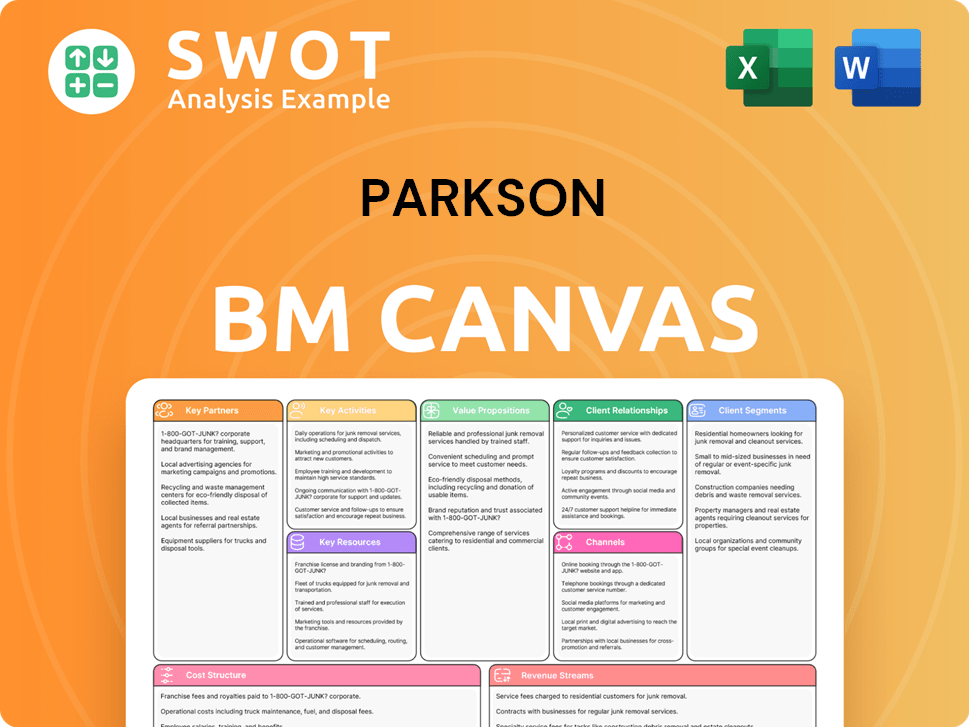
What Recent Changes Have Shaped Parkson’s Ownership Landscape?
Over the past few years, Parkson's operational landscape has seen significant shifts. The company, which was on the Singapore Exchange (SGX) watchlist, exited on October 4, 2024. As of March 31, 2025, Parkson had approximately $17 million in net current assets and $152 million in cash and short-term deposits. This indicates a solid financial position despite operational challenges.
The Parkson stores network has contracted considerably. From a peak of 70 outlets in 2017, the number of stores in Malaysia decreased to 37 by December 31, 2024. This reduction, combined with weaker consumer spending, impacted the company's financial performance. For the fiscal year ending December 31, 2024, revenue was S$214.8 million, a 3.1% decrease from the S$221.6 million in the previous year. Profit before tax also declined, reaching S$35.4 million compared to S$40.8 million in FY2023. However, net income for the first quarter ended March 31, 2025, increased to S$14.7 million from S$12.1 million in the same period a year ago.
| Financial Year Ended | Revenue (S$ million) | Profit Before Tax (S$ million) |
|---|---|---|
| December 31, 2023 | 221.6 | 40.8 |
| December 31, 2024 | 214.8 | 35.4 |
Despite these challenges, Parkson Retail Asia announced a special interim dividend of 4 cents per share on May 14, 2025, which was paid on June 12, 2025. This was the first dividend in almost a decade. The payout of S$27 million represents half of its net asset value of 8 cents per share. Management is focused on improving operations, enhancing product offerings, improving gross margins, optimizing operational efficiency, and managing costs. They are also exploring new store openings.
Understanding Parkson ownership involves examining its corporate structure and major shareholders. The company's financial reports provide details on its ownership profile, which is crucial for investors and stakeholders.
Yes, Parkson is a publicly listed company. Investors can access financial information and track its performance through the Singapore Exchange (SGX), where it is listed. This status impacts its governance and reporting requirements.
Recent financial results show fluctuations in revenue and profit. While there have been declines in some areas, the company is taking steps to improve its financial standing. The dividend payout signals confidence in its financial health.
The company is focused on strategic initiatives to enhance its operations and financial performance. These include improving product offerings, optimizing costs, and exploring new store openings. The management's approach is key.
Parkson Porter's Five Forces Analysis
- Covers All 5 Competitive Forces in Detail
- Structured for Consultants, Students, and Founders
- 100% Editable in Microsoft Word & Excel
- Instant Digital Download – Use Immediately
- Compatible with Mac & PC – Fully Unlocked
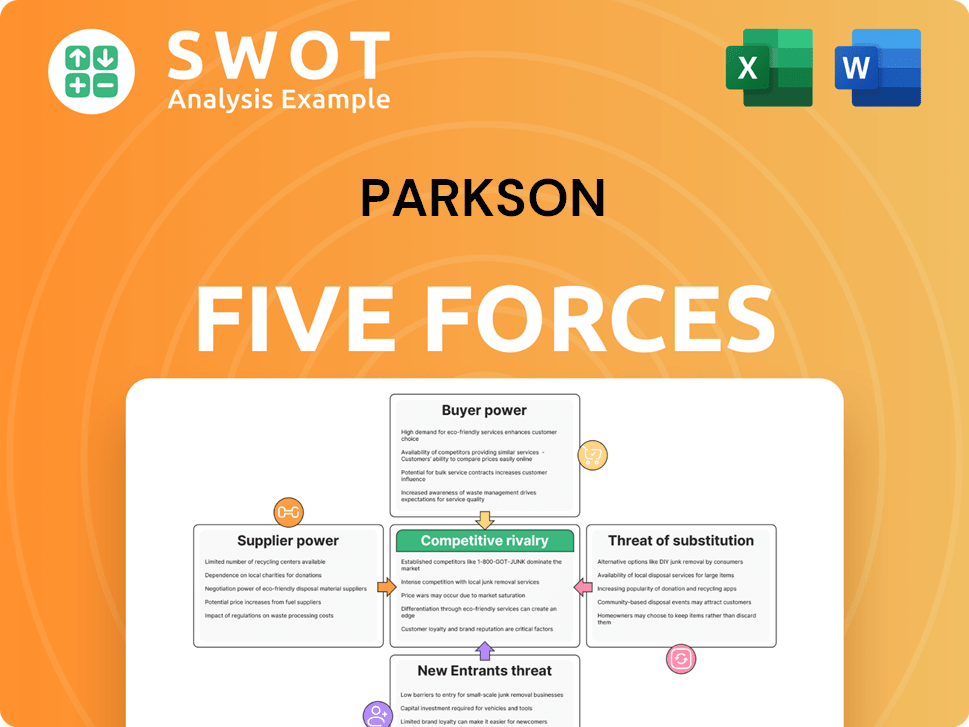
Related Blogs
- What are Mission Vision & Core Values of Parkson Company?
- What is Competitive Landscape of Parkson Company?
- What is Growth Strategy and Future Prospects of Parkson Company?
- How Does Parkson Company Work?
- What is Sales and Marketing Strategy of Parkson Company?
- What is Brief History of Parkson Company?
- What is Customer Demographics and Target Market of Parkson Company?
Disclaimer
All information, articles, and product details provided on this website are for general informational and educational purposes only. We do not claim any ownership over, nor do we intend to infringe upon, any trademarks, copyrights, logos, brand names, or other intellectual property mentioned or depicted on this site. Such intellectual property remains the property of its respective owners, and any references here are made solely for identification or informational purposes, without implying any affiliation, endorsement, or partnership.
We make no representations or warranties, express or implied, regarding the accuracy, completeness, or suitability of any content or products presented. Nothing on this website should be construed as legal, tax, investment, financial, medical, or other professional advice. In addition, no part of this site—including articles or product references—constitutes a solicitation, recommendation, endorsement, advertisement, or offer to buy or sell any securities, franchises, or other financial instruments, particularly in jurisdictions where such activity would be unlawful.
All content is of a general nature and may not address the specific circumstances of any individual or entity. It is not a substitute for professional advice or services. Any actions you take based on the information provided here are strictly at your own risk. You accept full responsibility for any decisions or outcomes arising from your use of this website and agree to release us from any liability in connection with your use of, or reliance upon, the content or products found herein.